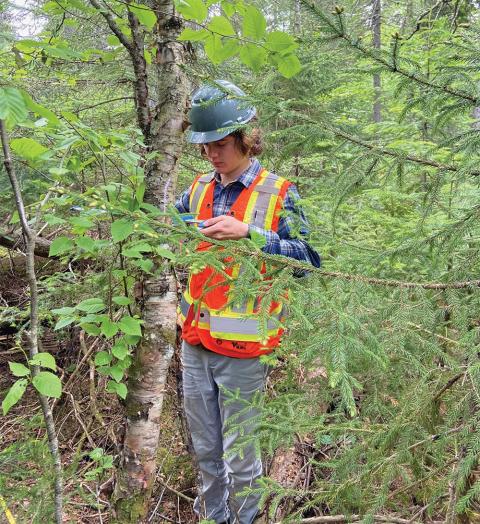
Nicolas Forestell is a double major in forestry and French from Newburyport, Massachusetts. He is working in Professor Heidi Asbjorsen's lab and contributing to her New Hampshire Agricultural Experiment Station funded research.
COLSA: Tell us about your research in as non-technical language as possible.
Nicholas Forestell: I am an undergraduate research assistant in Heidi Asbjornsen's Ecohydrology Lab. Her graduate students are conducting a variety of projects focusing on agroforestry, drought, syrup production and more. I have done a variety of tasks to help these projects such as planting trees for an agroforestry project, assembling and attaching sap-flow sensors to trees, coring trees followed by processing the cores, and making slides of and taking pictures of leaf stomata.
COLSA: What challenge does your research seek to address?
Nicholas: Each of our lab's projects focus on different issues but there is a common theme of helping forests and agroforestry adapt to a changing climate and other environmental threats. For example, Sam Zuckerman's drought-tolerance experiment on saplings is helping find seed sources for planting here in New Hampshire that will be more resistant to future droughts. Similarly, David Moore's experimentation on tapping different trees for syrup is helping to identify trees that will be more resistant to environmental change as the suitability of the region for sugar maples declines.

Nicholas measuring trees during his internship at Université Laval in Quebec City
COLSA: Your work elevates research supported by the NH Agricultural Experiment Station. How will it benefit people, communities and/or the natural environment in New Hampshire?
Nicholas: By finding solutions to problems posed by climate change and other threats, our research will help New Hampshire's foresters and farmers adapt. We are finding new ways of doing old things, be it tapping sycamores instead of sugar maples or planting fruiting species in multi-species groupings instead of singly.
COLSA: What are you learning as a result of you experience?
Nicholas: While I am learning a variety of laboratory and field techniques, I think the exposure I am getting to different research areas and the connections I am making are more important. Each of the graduate students I have worked with has been a wealth of knowledge and taught me much about their projects as I assisted them.
COLSA: What should prospective students should know about UNH?
Nicholas: Our school is very diverse in the backgrounds of its students and the types of majors offered. No matter your interests and personality, you will certainly make lots of friends and partake in lots of interesting activities and experiences during your time here.
COLSA: What do you love most about UNH?
Nicholas: While there are many things I love about UNH, I think one of the most important and undervalued assets is College Woods. Many universities including those that offer forestry do not have easy access to forestland from campus, and even fewer have as unique a feature as College Wood's old-growth forest. The proximity of College Woods allows labs to easily get outside to practice and learn in the field, allows student researchers to conduct a variety of projects without having to step off campus, and allows students to easily get outside and partake in a variety of recreational activities.
The NH Agricultural Experiment Station helps improve New Hampshire's lives, livelihoods and landscapes through research and discoveries that sustain agricultural, food and forested ecosystems and supporting the development of future scientists. The Station research described above is based on work with joint funding from the USDA National Institute of Food and Agriculture under McIntire-Stennis award number 7005871 and the state of New Hampshire.